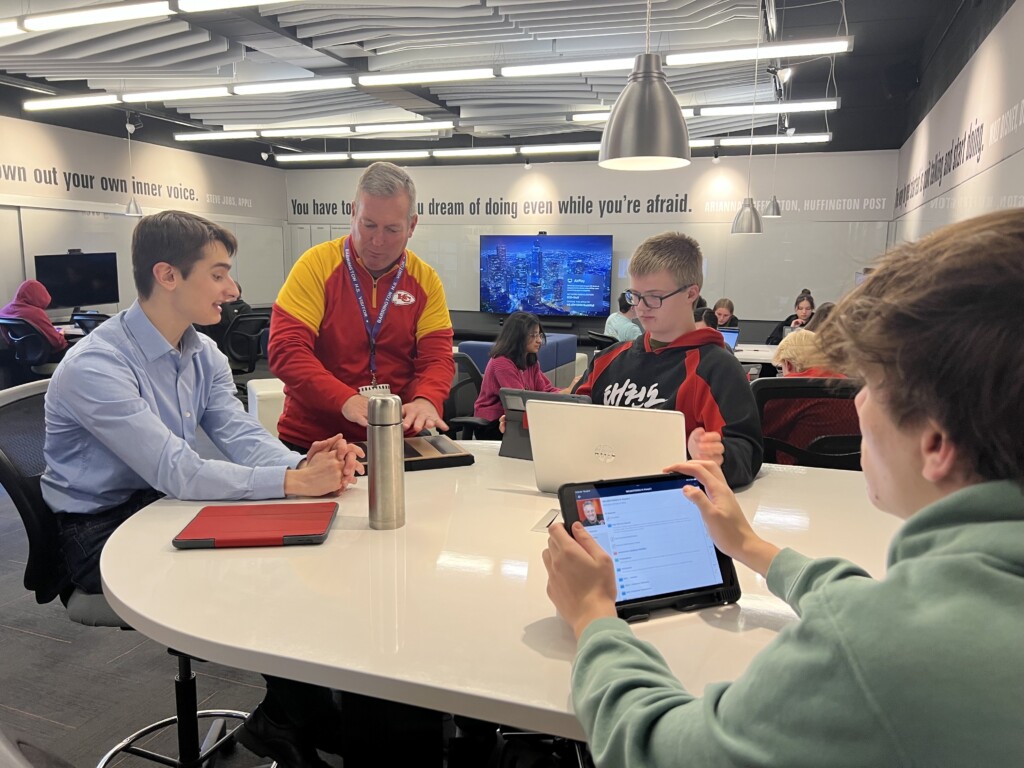Entrepreneurship: The New Core Curriculum
Key Points
-
Entrepreneurship education fosters resilience, creativity, and financial literacy—skills critical for success in an unpredictable, tech-driven world.
-
Programs like NFTE, Junior Achievement, and Uncharted Learning empower students by offering real-world entrepreneurial experiences and mentorship.

“Entrepreneurship is the job of the future”
-Charles Fadel, Education for the Age of AI
The traditional high school curriculum was designed for the 20th-century economy: memorize facts, follow instructions, and land a steady job at a large, stable corporation. Today, that economy is a relic. We now live in a world defined by exponential technological change, unpredictable market shifts, and a dizzying speed of disruption. For the students sitting in classrooms right now, success isn’t about memorizing the right answers; it’s about asking the right questions and creating the answers themselves.
This shift requires a radical re-evaluation of what we teach. Education leaders across the country are realizing that the most valuable skill we can impart is not accounting or marketing, but the entrepreneurial mindset. This mindset—built on resilience, creative problem-solving, comfort with ambiguity, and the ability to pivot—is essential in startups, as an intrapreuer in big organizations, or as a citizen working for the common good.
Over the last few years, we’ve supported The Real World Learning initiative in metro Kansas City (sponsored by the Kauffman Foundation). This collaboration of ninety high schools has a shared commitment to offering entrepreneurial experiences under the category of a “Market Value Asset,” a signifier of a valuable real-world experience. With help from a handful of key entrepreneurship organizations and a lot of local efforts, Kansas City learners have in and out-of-school access to entrepreneurial experiences (those seeking enterprise value as well as social impact). It’s the best regional effort to make the entrepreneurial mindset systematic and invite learners to experience entrepreneurial success.
Although finding adoption in Kansas City, these entrepreneurship organizations (and others like them) have a reach that extends well beyond the greater KC region, pioneering effective models to bring real-world entrepreneurial learning to every student. These groups are proving that the best way to teach entrepreneurship is not through textbooks, but by empowering students to start real businesses and solve real problems.
Foundational Imperative: Building Resilience and Financial Literacy
Before a student can launch a startup, they need the foundational knowledge and the personal belief that they can succeed. This is where organizations focused on breadth and foundational skills take the lead.
One of the most powerful movements in this space is the work done by NFTE (Network for Teaching Entrepreneurship). NFTE focuses explicitly on bringing entrepreneurship education to students from low-income communities. Their philosophy is based on the idea that every young person possesses the potential for innovation, but they often lack the exposure and resources. NFTE’s programs guide students through the process of developing a viable business plan, conducting market research, and pitching their concepts to real investors. By linking economic opportunity directly to personal agency, NFTE ensures that entrepreneurship is a path available to all, regardless of zip code. They don’t just teach business; they teach students to see obstacles as opportunities and to command a room with confidence.
Similarly, Junior Achievement (JA) serves as a critical entry point for millions of students globally, spanning K-12 education. JA’s curriculum emphasizes workforce readiness, entrepreneurship, and financial literacy. Their programs—often delivered by volunteer mentors from the business community—provide foundational concepts that demystify the business world. Whether it’s running a mock city for a day or learning the basics of budgeting and investment, Junior Achievement prepares students to understand the enterprise system from a young age, ensuring that when they hit middle and high school, the concept of starting a business feels attainable rather than abstract.
Together, the work of NFTE and Junior Achievement establishes the two essential prerequisites for modern entrepreneurship: economic access and financial grounding.
The Experiential Imperative: Learning by Launching
While knowledge is essential, modern entrepreneurship education is defined by its embrace of experiential learning—the lean startup model applied directly to the classroom. This approach insists that students must validate a market need, prototype a solution, and iterate based on feedback.
Leading this deep, immersive approach is Uncharted Learning. Their flagship programs, the IncubatorEDU and Accelerator, turn the classroom into a start-up hub. Students aren’t writing theoretical business plans; they are launching and managing actual ventures. They form teams, pitch their ideas to a panel of expert volunteers who act as their coaches and advisory board, and even seek seed funding from a real funding board. This structure forces students to learn the harsh realities of product-market fit, capital allocation, and team dynamics in a safe, yet rigorous, environment. By the time they graduate, students possess a portfolio that includes a functioning product, an established brand, and the scars of a few failed experiments—the true mark of a budding entrepreneur.
Complementing this launch-focused approach is the work of The Possible Zone (TPZ), which is deeply rooted in career exposure and industry partnership. Boston-based TPZ recognizes that sustainable entrepreneurship requires connecting student passion to real economic pathways. Their model integrates design thinking, project-based learning, and professional skills development, but their greatest strength lies in linking students with professional mentors and industry partners. This doesn’t just teach the students how to build a product; it connects them with the people who run successful companies, showing them the variety of roles—not just “CEO”—that contribute to a successful venture. TPZ ensures that entrepreneurial projects are grounded in a realistic understanding of professional expectations and opportunities.
Fostering the Mindset: Making it Systemic
The ultimate goal of these programs is to cultivate the entrepreneurial mindset—a set of durable skills more valuable than any specific business knowledge. For this educational shift to be successful, it must become systemic, championed by educators and integrated into the school culture itself.
The StartEdUp Foundation plays a vital role in advocating for this systemic change. Founded by entrepreneur and educator Don Wettrick, StartEdUp focuses on training teachers and advocating for student-led innovation (see podcast). Their work is driven by the conviction that curiosity, grit, and the ability to embrace failure are the traits that matter most. By providing professional development and resources, StartEdUp empowers teachers to transition from being lecturers to becoming facilitators of student innovation. With the best student pitch competition in the country, StartEdUp helps Indiana schools create the cultural space for students to take risks, follow their passions, and solve problems that matter to them.
This coalition of NFTE, Junior Achievement, Uncharted Learning, The Possible Zone, and StartEdUp paints a clear picture of the future of high school education. It is a future where every student, regardless of background, is armed with the financial knowledge to manage their future, the practical experience to launch a product, and the unshakeable self-belief to define their own path.
The skills learned—from building a balance sheet to pitching an investor—are no longer electives. They are the core curriculum for a new generation ready to build the jobs and solutions of tomorrow. Investing in entrepreneurship education isn’t just a good idea; it’s an economic imperative. The next great company is waiting to be launched by a student who finally found a classroom that valued their ideas as much as their test scores.







0 Comments
Leave a Comment
Your email address will not be published. All fields are required.